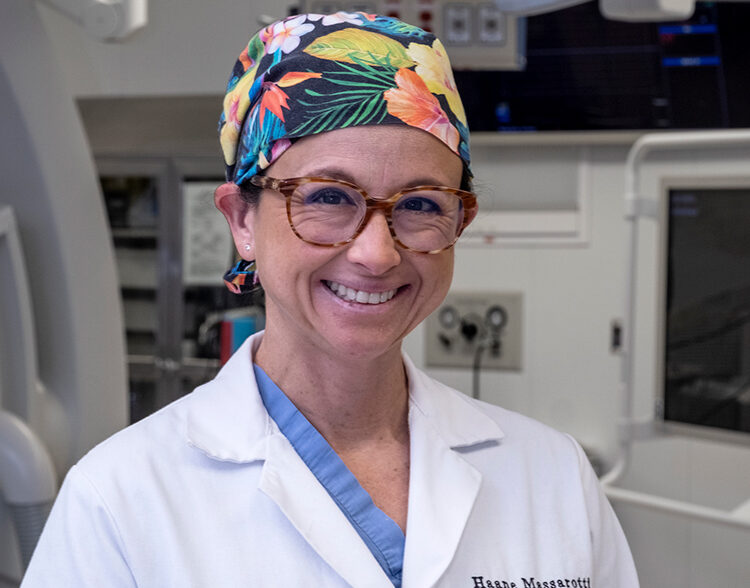
Colorectal cancer new diagnosis and mortality rates for individuals over 50 have been dropping steadily for decades – mainly due to more screening options that can identify precancerous polyps and remove them before they turn into cancer. But the disease has been increasing among younger people at an alarming rate at the same time.
“No one knows for sure why there is this increase in colorectal cancer in young people,” said Dr. Haane Massarotti, the only colorectal surgeon on the staff at Cleveland Clinic Indian River Hospital. “We believe it’s related to obesity, low fiber, processed foods, heavy alcohol use and a more sedentary lifestyle as younger people spend more time on social media and their phones than being outside exercising. It’s a combination of genetic and environmental factors that we are still trying to figure out.”
Whatever the cause or causes, the American Cancer Society reports that the disease has been steadily increasing over the past 30 to 50 years in younger adults and that people born in 1990 have double the risk of developing colon cancer and quadruple the risk of rectal cancer as people born in 1950.
The most recent data which tracked the incidence of colorectal cancer from 2011 to 2016 revealed an up-to-2 percent-per-year increase in the disease among people under the age of 50. The disease has become the leading cause of cancer deaths for Americans 20-to-49 years old, according to the National Cancer Institute.
“The key to a healthy gut is having the right balance of bacteria. When the bacteria in your colon and rectum is imbalanced, your immune system gets compromised. Without that balance the immune system can’t fight insults from the food you eat, antibiotics and alcohol. Our immune system is fighting a constant battle. Another theory is that maternal obesity is putting the child at risk for rectal cancer in utero.”
With that in mind, Dr. Massarotti stresses the importance of young people taking charge of their health – and paying attention to any abnormal symptoms.
“Just because they are young doesn’t make them immune. If they have any issues such as rectal bleeding, abdominal pain, anemia or unexplained weight loss, I would recommend a colonoscopy sooner rather than later. Having the resources and ability to seek care is the key, and once they seek care they need to make sure that the provider understands these symptoms should not be ignored.”
Having a family history of colorectal cancer involving a father, mother or sibling increases the chances of getting the disease. Young people should talk to their parents about their history with colonoscopy screenings and whether or not polyps were detected. Those at highest risk are people with hereditary genetic mutations like inflammatory bowel disease, lynch disease, polyposis syndrome, Crohn’s disease and colitis. That being said, the majority of colorectal cancers are sporadic, meaning that none of these things were in place. There was no family history or hereditary risk.
“Younger patients tend to be diagnosed at a more advanced stage (stage 3 or 4) than those over 50,” Dr. Massarotti said. “This is most likely due to the screening in older patients that allows us to catch it earlier. These younger patients were most likely predisposed to having it and have had it for a while before any symptoms appeared. It takes about 10 years for a polyp to become cancerous, so by the time they experience symptoms it’s often already in an advanced stage.”
The American Cancer Society guidelines recommend that people at average risk for colorectal cancer start screening at age 45. Additional risk factors like inflammatory bowel disease, polyps, a history of abdominal radiation for cancer, certain hereditary syndromes or a family history of colorectal cancer may be cause for earlier screening.
“I truly believe that in 20 or 30 years we will have enough data to see those guidelines drop [to a younger age],” Dr. Massarotti surmised. “For now, it’s up to the individual to pay attention to their own bodies and watch for any abnormal signs.”
The good news is that the overall survival rate for colorectal cancer is 91 percent. Younger patients diagnosed at later stages of the disease tend to get more aggressive treatment in the form of chemotherapy because they can tolerate the side effects. With colon cancer, surgery is generally used to remove the tumor. Rectal cancer can be removed with surgery in the very early stages but is treated with chemotherapy in the later stages.
“Both cancers can be diagnosed with a colonoscopy, and rectal cancer can even be diagnosed in many cases with a basic rectal exam,” Dr. Massarotti continued. “Treatment has advanced, and minimally invasive surgery is the standard of care. Once you are diagnosed you can be treated with a minimally invasive surgery and go on living a good quality of life.
“Cleveland Clinic Indian River Hospital offers a multi-disciplinary approach where we don’t just treat the cancer but treat you as a whole. We treat the patient – not the disease.
We consult with the family and talk about how it will affect your life and work. A diagnosis of cancer doesn’t mean the end of life. It’s very treatable with the right care team. There is hope, so don’t ignore any symptoms such as rectal bleeding, constipation or diarrhea, anemia or abdominal pain.”
Dr. Haane Massarotti received her medical degree from the University of Hawaii John A. Burns School of Medicine and completed her general surgery residency at the Lehigh Valley Health Network in Allentown, Pennsylvania. Her ACGME fellowship in colon and rectal surgery was completed at Cleveland Clinic Florida. As a colorectal surgeon she is double board-certified – recognized by the American Board of Surgery for general surgery with additional certification through the American Board of Colon and Rectal Surgery. Her office is located in the Health and Wellness Center at Cleveland Clinic Indian River Hospital, 3450 11th Court, Vero Beach. For an appointment call 772-770-0323.



